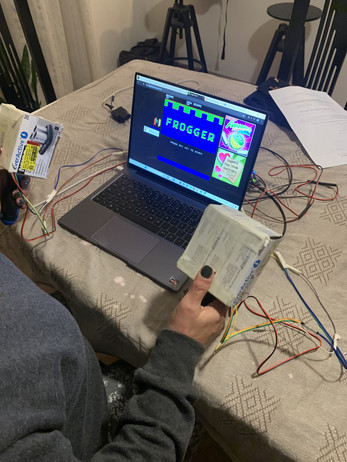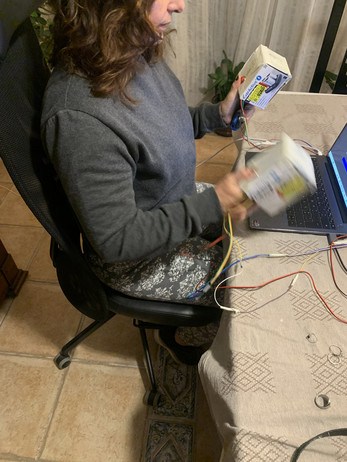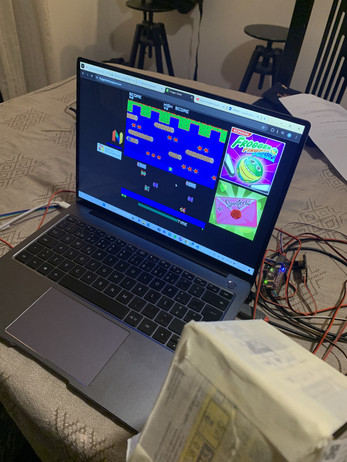Frogger of the Maracas
A downloadable Frogger of the Maracas
Project Description
The "Frogger das Maracas" project was developed as part of the UX Design for Digital Games course in the Video Games degree at Universidade Lusófona, with the goal of transforming the experience of a classic game into a more physical and engaging challenge. Using maracas as alternative controls, we aimed to promote a gaming experience that combines physical activity and interactivity.
Gameplay Experience
The proposed gameplay experience is designed to be innovative and immersive, where players use maracas to control the main character of Frogger. Moving the right maraca forward causes the frog to move forward, while moving the left maraca forward makes the frog move backward. Additionally, pressing the buttons on the maracas allows the frog to move left and right. This approach encourages players to move more, promoting an active gaming experience that challenges not only mental dexterity but also physical coordination, making each game session a fun and healthy activity.
Tangible Technology
To create the maraca-based gameplay experience, the following components and materials were used:
- Cardboard for the boxes: Serves as the structure of the maracas.
- Fixed screwdrivers inside the boxes: Provide support and stability for the maracas.
- Duct tape: Used to reinforce the maraca boxes, ensuring they remain firm during use.
- Hot glue: Used to fix the screwdrivers to the cardboard boxes, ensuring solid assembly.
- Arduino Nano: Processes the signals from the sensors and buttons.
- Two motion sensors: Detect the movements of the maracas.
- Two click buttons: Integrated into the maracas to control the lateral (left and right) movements of the character.
- DFRobot: Used to expand the Arduino’s ports, with one port for each motion sensor and another for the buttons.
- Python script: Developed to interpret signals from the Arduino and convert them into actions within the Frogger game.
- Connection cables: Connect the sensors and buttons to the Arduino controller and the DFRobot module.
- USB cable: Connects the Arduino to the computer, allowing data transfer and powering the controller.
- Online Frogger game site: The game where the physical maraca controls are applied.
Overall System Operation
The movements of the maracas, including button commands, are processed through a Python script. The motion sensors and buttons send signals to the Arduino Nano, which processes this information using the code developed in the Arduino IDE (Frogger.ino). The DFRobot module is used to expand the Arduino's ports, with each motion sensor and button connected to specific ports. The Arduino then sends this data to the Python script (Frogger.py), which translates the received signals into keyboard actions on the computer, controlling the character in the Frogger game.
| Status | Prototype |
| Category | Other |
| Authors | Rafael José, Rodrigo Gomes |
| Tags | Arcade, Controller |
| Average session | A few minutes |
Download
Click download now to get access to the following files:



Leave a comment
Log in with itch.io to leave a comment.